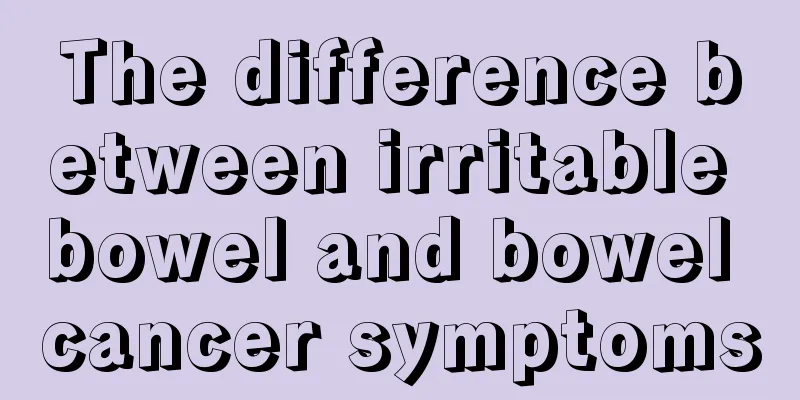The difference between irritable bowel and bowel cancer symptoms

|
There are obvious differences in the symptoms of irritable bowel syndrome (IBS) and colorectal cancer. IBS is mainly manifested by abdominal pain, bloating, diarrhea or constipation, while colorectal cancer may be accompanied by symptoms such as weight loss, blood in the stool, and anemia. IBS is usually not life-threatening, but colorectal cancer requires prompt medical treatment. 1. Symptoms of Irritable Bowel Syndrome Irritable bowel syndrome is a functional intestinal disease with symptoms such as abdominal pain, bloating, diarrhea or constipation, and these symptoms are usually related to defecation. Abdominal pain may be relieved after defecation, and symptoms may recur, but will not lead to weight loss or blood in the stool. The cause of irritable bowel syndrome may be related to factors such as increased intestinal sensitivity, intestinal flora imbalance, and psychological stress. In terms of treatment, symptoms can be improved by adjusting diet such as a low FODMAP diet, taking probiotics, and relieving stress. 2. Symptoms of Bowel Cancer The symptoms of colorectal cancer are usually more serious and may include blood in the stool, weight loss, anemia, persistent abdominal pain, or changes in bowel habits such as alternating diarrhea and constipation. Blood in the stool may be bright red or dark red, and weight loss and anemia may be related to the tumor consuming nutrients in the body. The cause of colorectal cancer may be related to factors such as genetics, long-term inflammatory bowel disease, and a high-fat, low-fiber diet. In terms of treatment, early colorectal cancer can be removed surgically, while mid- and late-stage colorectal cancer may require a combination of chemotherapy, radiotherapy, and other comprehensive treatments. 3. How to distinguish between irritable bowel syndrome and colon cancer The symptoms of irritable bowel syndrome are usually mild and not accompanied by weight loss or blood in the stool, while the symptoms of colorectal cancer are more severe and persistent. If you experience blood in the stool, weight loss or persistent abdominal pain, you should seek medical attention for a colonoscopy to confirm the diagnosis. Colonoscopy is a key means of distinguishing the two, and it can visually observe whether there are tumors or other lesions in the intestine. There are significant differences in the symptoms of irritable bowel syndrome and colorectal cancer. Irritable bowel syndrome is usually not life-threatening, but colorectal cancer requires prompt medical treatment. If you experience blood in your stool, weight loss, or persistent abdominal pain, you should undergo a colonoscopy to rule out the possibility of colorectal cancer. Early detection and treatment of colorectal cancer can significantly increase the cure rate, so regular screening is particularly important for high-risk groups such as those with a family history or long-term inflammatory bowel disease. |
<<: Symptoms of secondary chondrosarcoma
>>: Can women with kidney cancer have children?
Recommend
Palmoplantar pustular disease
The cause of palmoplantar pustular disease is sti...
Does 8 chemotherapy sessions after breast cancer surgery mean the condition is serious?
Does 8 chemotherapy sessions after breast cancer ...
Notes on vital signs
The method of checking vital signs is determined ...
What should I do if paronychia becomes purulent?
If paronychia becomes suppurative, it means the c...
Three symptoms indicate that lung cancer has spread
Lung cancer has spread and there are more than ju...
Which type of people are more susceptible to liver cancer? To prevent liver cancer, you should eat more of these foods
Liver cancer has a very high incidence in my coun...
What are the dangers of frequent hair dyeing
Normally, many women dye their hair frequently. D...
Can regular facial mask application delay aging?
When it comes to aging, it is something that no w...
Can green wild mangoes be eaten?
The mangoes we usually eat are cultivated mangoes...
What to do if you often have palpitations
There are actually many reasons for palpitations....
The fastest way to sober up
Behind the increase in income lies enormous press...
What is lymphoma and what foods are good for patients
Lymphoma is not unfamiliar to many people today, ...
What does anal fissure triad mean? It turns out to be these three types
Patients with anorectal diseases often hear the t...
If you have neck discomfort, beware of cervical spondylosis
If your neck is uncomfortable, is it a stiff neck...
Six major clinical manifestations of liver cancer
Liver cancer is a malignant tumor with a mortalit...









